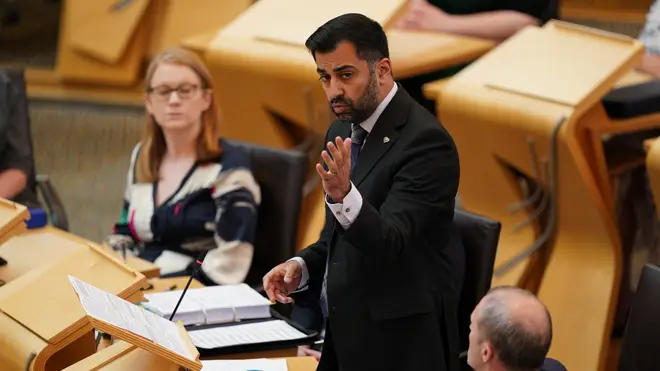
Natasha Devon 6pm - 10pm
3 July 2023, 12:04

The strikes, Humza Yousaf said, would likely cause ‘major disruption’ to NHS services.
Scotland’s First Minister will chair a meeting of ministers and health officials to plan contingencies for expected junior doctor strikes this month.
The British Medical Association (BMA) announced last month that junior doctors in Scotland would reject a 14.5% pay increase over two years and strike between July 12 and 15.
Dr Chris Smith, the chair of the BMA’s Scottish junior doctors committee, said taking strike action was an “absolute last resort” and those walking out were “standing up for the future of the NHS”.
But the First Minister said on Monday there was likely to be “major disruption” as a result of the action.
On Monday, Humza Yousaf will chair a meeting of the Scottish Government Resilience Room (SGoRR) – the equivalent of the UK Government’s Cobra meeting – to plan contingencies.
Speaking ahead of the meeting, the First Minister said: “Junior doctors make an extremely important contribution to NHS Scotland – which is why we have offered a fair and progressive rise which will mean a cumulative pay increase of 14.5% over two years, the best offer on the table in the UK.
“We have been clear to the BMA that we are willing to match the pay uplift we have given to nurses, midwives, and other Agenda for Change staff, for junior doctors.
“This is the biggest investment in junior doctor pay for the last 20 years and a step forward to modernising pay bargaining, restoring confidence among junior doctors and ensuring their contribution to our healthcare system is appropriately recognised.
“While I am disappointed that BMA Scotland members are proceeding with plans for industrial action, the Scottish Government will continue to work with NHS Scotland to make sure appropriate contingency plans are in place in order to minimise any potential disruption to services.
“However, we have to be upfront with the public – a junior doctors’ strike will cause major disruption and result in the significant cancellation of treatment, surgery and care the NHS is able to provide.”
Deputy First Minister Shona Robison, Health Secretary Michael Matheson, the chief medical officer Dr Sir Gregor Smith and NHS officials will also be in attendance.
On Monday, Dr Smith said: “Junior doctors in Scotland have consistently and strongly made clear that the pay offers made so far by the Scottish Government are not yet sufficient to demonstrate a commitment to reverse the years of pay erosion we have suffered, which has seen pay reduced by 28.5% since 2008.
“No-one can seriously argue a junior doctor today is worth that much less than a counterpart 15 years ago. Indeed, our members rejected the Scottish Government’s latest offer decisively.
“Unless we act now and invest in the future of the workforce, we will go on losing doctors to places they are valued properly, compromising the care we can provide to the people of Scotland now and in the future.
“It is on that basis we have reluctantly been pushed to announce strike dates for later this month – and in doing so we gave extra time for health boards and the Scottish Government to prepare.
“It is good to see this time being used effectively – and the seriousness with which planning is being taken shows just how crucial a role junior doctors play.
“Given the level of disruption we accept a strike will cause, it is crucial that the active negotiations we are still engaging in with the Scottish Government produce the improved offer that we know is needed.”